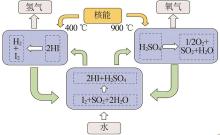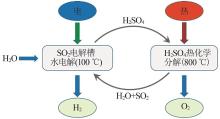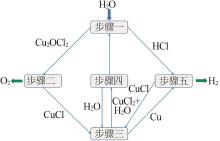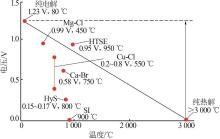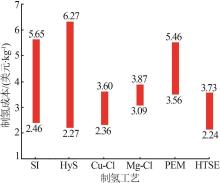Inorganic Chemicals Industry ›› 2022, Vol. 54 ›› Issue (9): 21-27.doi: 10.19964/j.issn.1006-4990.2021-0575
• Reviews and Special Topics • Previous Articles Next Articles
Economic analysis and research on nuclear hydrogen production technology based on thermochemical cycle
LI Zhiyong( ),YU Qian,HU Jiang,RONG Mei,SHANG Xin,ZHANG Yifan
),YU Qian,HU Jiang,RONG Mei,SHANG Xin,ZHANG Yifan
- China Nuclear Power Engineering Corporation,Beijing 100840,China
-
Received:2021-09-23Online:2022-09-10Published:2022-09-22
CLC Number:
Cite this article
LI Zhiyong,YU Qian,HU Jiang,RONG Mei,SHANG Xin,ZHANG Yifan. Economic analysis and research on nuclear hydrogen production technology based on thermochemical cycle[J]. Inorganic Chemicals Industry, 2022, 54(9): 21-27.
share this article
Table 1
Parameters of different reactor types and suitable hydrogen production processes"
| 堆型 | 常用燃料 | 出口温度/℃ | 功率 | 适合制氢工艺 |
|---|---|---|---|---|
| 压水堆 | UO2、MOX | 280~325 | 2 000~4 800 MWth,600~1 700 MWe | 水电解 |
| 重水堆 | UO2 | 310~319 | 2 000~3 200 MWth,700~1 100 MWe | 水电解 |
| 超临界水堆 | UO2、Th/U、MOX | 430~625 | 600~2 540 MWth,700~1 150 MWe | 水电解、热化学循环 |
| 钠冷快堆 | U、Pu、MOX | 500~800 | 45~3 000 MWth,20~1 100 MWe | 水电解、热化学循环、甲烷蒸汽重整 |
| 熔盐堆 | UO2、Th/U | 750~1 000 | 900~2 400 MWth,400~1 200 MWe | 水电解、蒸汽电解、热化学循环、甲烷蒸汽重整 |
| 气冷快堆 | MOX | 850 | 600~2 400 MWth,280~1 100 MWe | 水电解、蒸汽电解、热化学循环、甲烷蒸汽重整 |
| 高温气冷堆 | UO2、PuO2、MOX | 750~950 | 100~600 MWth,45~300 MWe | 水电解、蒸汽电解、热化学循环、甲烷蒸汽重整 |
| [1] | NICOLETTI G, ARCURI N, NICOLETTI G, et al.A technical and environmental comparison between hydrogen and some fossil fu⁃els[J].Energy Conversion and Management,2015,89:205-213. |
| [2] | 李亮荣,付兵,刘艳,等.生物质衍生物重整制氢研究进展[J].无机盐工业,2021,53(9):12-17. |
| LI Liangrong, FU Bing, LIU Yan, et al.Research progress of hydrogen production by reforming biomass⁃derived compounds[J].Inorganic Chemicals Industry,2021,53(9):12-17. | |
| [3] | 郭博文,罗聃,周红军.可再生能源电解制氢技术及催化剂的研究进展[J].化工进展,2021,40(6):2933-2951. |
| GUO Bowen, LUO Dan, ZHOU Hongjun.Recent advances in renewable energy electrolysis hydrogen production technology and related electrocatalysts[J].Chemical Industry and Engineering Pro⁃gress,2021,40(6):2933-2951. | |
| [4] |
MAO Yanpeng, GAO Yibo, DONG Wei, et al.Hydrogen production via a two⁃step water splitting thermochemical cycle based on metal oxide-A review[J].Applied Energy,2020,267.Doi:10.1016/j.apenergy.2020.114860.
doi: 10.1016/j.apenergy.2020.114860. |
| [5] | 张平,徐景明,石磊,等.中国高温气冷堆制氢发展战略研究[J].中国工程科学,2019,21(1):20-28. |
| ZHANG Ping, XU Jingming, SHI Lei, et al.Nuclear hydrogen production based on high temperature gas cooled reactor in China[J].Engineering Science,2019,21(1):20-28. | |
| [6] | 王建强,戴志敏,徐洪杰.核能综合利用研究现状与展望[J].中国科学院院刊,2019,34(4):460-468. |
| WANG Jianqiang, DAI Zhimin, XU Hongjie.Research status and prospect of comprehensive utilization of nuclear energy[J].Bulletin of Chinese Academy of Sciences,2019,34(4):460-468. | |
| [7] | MEHRPOOYA M, GHORBANI B, EKRATALESHIAN A, et al.Investigation of hydrogen production by sulfur⁃iodine thermochemical water splitting cycle using renewable energy source[J].International Journal of Energy Research,2021,45(10):14845-14869. |
| [8] | JUÁREZ-MARTÍNEZ L C, ESPINOSA-PAREDES G,VÁZQUEZ- |
| RODRÍGUEZ A, et al.Energy optimization of a sulfur⁃iodine thermochemical nuclear hydrogen production cycle[J].Nuclear Engineering and Technology,2021,53(6):2066-2073. | |
| [9] | 徐少杰.硫碘循环制氢中碘化氢的分离及电化学碘化氢分解特性试验研究[D].杭州:浙江大学,2018. |
| XU Shaojie.Study on HI separation and the characteristics of electrochemical HI decomposition in the sulfur⁃iodine cvcle for hydrogen production[D].Hangzhou:Zhejiang University,2018. | |
| [10] | PARK J, LEE J, JEON J, et al.Process optimization and safety assessment on a pilot⁃scale bunsen process in sulfur⁃iodine cycle[J].International Journal of Hydrogen Energy,2021,46(67):33616-33634. |
| [11] | ROSEN M A.Advances in hydrogen production by thermochemical water decomposition:A review[J].Energy,2010,35(2):1068-1076. |
| [12] | 杨宇静,明大增,李志祥,等.硫化氢分解制氢的研究进展[J].无机盐工业,2013,45(2):5-7,14. |
| YANG Yujing, MING Dazeng, LI Zhixiang, et al.Research progress of hydrogen production from hydrogen sulfide[J].Inorganic Chemicals Industry,2013,45(2):5-7,14. | |
| [13] | 张平,于波,徐景明.核能制氢技术的发展[J].核化学与放射化学,2011,33(4):193-203. |
| ZHANG Ping, YU Bo, XU Jingming.Development of the technology for nuclear production of hydrogen[J].Journal of Nuclear and Radiochemistry,2011,33(4):193-203. | |
| [14] | OZBILEN A, DINCER I, ROSEN M A.Environmental impact assessment of nuclear assisted hydrogen production via Cu-Cl thermochemical cycles[J].Sustainable Cities and Society,2013,7:16-24. |
| [15] | 王涵,李世安,杨发财,等.氢气制取技术应用现状及发展趋势分析[J].现代化工,2021,41(2):23-27. |
| WANG Han, LI Shian, YANG Facai, et al.Application status and development trend analysis of hydrogen production technologi⁃es[J].Modern Chemical Industry,2021,41(2):23-27. | |
| [16] | ODUKOYA A, NATERER G F, ROEB M, et al.Progress of the IAHE nuclear hydrogen division on international hydrogen production programs[J].International Journal of Hydrogen Energy,2016,41(19):7878-7891. |
| [17] | YILMAZ F, SELBAŞ R.Investigation and performance assessment of calcium bromine cycle for hydrogen production[J].International Journal of Global Warming,2019,17(3):279-296. |
| [18] | SIMPSON M F, UTGIKAR V, SACHDEV P, et al.A novel method for producing hydrogen based on the Ca-Br cycle[J].International Journal of Hydrogen Energy,2007,32(4):505-509. |
| [19] | OZCAN H, DINCER I.Experimental investigation of an improved version of the four⁃step magnesium⁃chlorine cycle[J].International Journal of Hydrogen Energy,2018,43(11):5808-5819. |
| [20] |
SAFARI F, DINCER I.A review and comparative evaluation of thermochemical water splitting cycles for hydrogen production[J].Energy Conversion and Management,2020,205.Doi:10.1016/j.enconman.2019.112182.
doi: 10.1016/j.enconman.2019.112182. |
| [21] | 任耀宇,马景陶,昝青峰,等.高温电解水蒸汽制氢关键材料研究进展[J].硅酸盐学报,2011,39(7):1067-1074. |
| REN Yaoyu, MA Jingtao, ZAN Qingfeng, et al.Development on key materials for hydrogen production via high⁃temperature steam electrolysis[J].Journal of the Chinese Ceramic Society,2011,39(7):1067-1074. | |
| [22] | 高立本,沈健.高温气冷堆多用途应用前景[J].中国核工业,2017(2):40-41. |
| [23] |
PINSKY R, SABHARWALL P, HARTVIGSEN J, et al.Comparative review of hydrogen production technologies for nuclear hybrid energy systems[J].Progress in Nuclear Energy,2020,123.Doi:10.1016/j.pnucene.2020.103317.
doi: 10.1016/j.pnucene.2020.103317. |
| [24] | EL-EMAM R S, ÖZCAN H.Comprehensive review on the techno⁃economics of sustainable large⁃scale clean hydrogen produc⁃tion[J].Journal of Cleaner Production,2019,220:593-609. |
| [25] |
MEHRPOOYA M, HABIBI R.A review on hydrogen production thermochemical water⁃splitting cycles[J].Journal of Cleaner Production,2020,275.Doi:10.1016/j.jclepro.2020.123836.
doi: 10.1016/j.jclepro.2020.123836. |
| [26] |
MARTINO M, RUOCCO C, MELONI E, et al.Main hydrogen production processes:An overview[J].Catalysts,2021,11(5).Doi:10.3390/catal11050547.
doi: 10.3390/catal11050547. |
| [27] | SAMALOVA L, CHVALA O, MALDONADO G I.Comparative economic analysis of the integral molten salt reactor and an advanced PWR using the G4-ECONS methodology[J].Annals of Nuclear Energy,2017,99:258-265. |
| [28] | EL-EMAM R S, KHAMIS I.International collaboration in the IAEA nuclear hydrogen production program for benchmarking of HEEP[J].International Journal of Hydrogen Energy,2017,42(6):3566-3571. |
| [29] | KEIPI T, TOLVANEN H, KONTTINEN J.Economic analysis of hydrogen production by methane thermal decomposition:Comparison to competing technologies[J].Energy Conversion and Ma⁃ nagement,2018,159:264-273. |
| [30] | 谢欣烁,杨卫娟,施伟,等.制氢技术的生命周期评价研究进展[J].化工进展,2018,37(6):2147-2158. |
| XIE Xinshuo, YANG Weijuan, SHI Wei, et al.Life cycle assessment of technologies for hydrogen production:A review[J].Che⁃mical Industry and Engineering Progress,2018,37(6):2147-2158. | |
| [31] | OZBILEN A, DINCER I, ROSEN M A.Comparative environmental impact and efficiency assessment of selected hydrogen production methods[J].Environmental Impact Assessment Review,2013,42:1-9. |
| [32] | CETINKAYA E, DINCER I, NATERER G F.Life cycle assessment of various hydrogen production methods[J].International Journal of Hydrogen Energy,2012,37(3):2071-2080. |
| [33] | 于盼望.面向可持续发展的制氢过程多目标流程优化[D].杭州:浙江工业大学,2019. |
| YU Panwang.Multi-objective optimization for sustainable hydrogen generation process[D].Hangzhou:Zhejiang University ofTechnology,2019. | |
| [34] | KARACA A E, DINCER I, GU Junjie.Life cycle assessment study on nuclear based sustainable hydrogen production options[J].International Journal of Hydrogen Energy,2020,45(41):22148-22159. |
| [1] | WANG Chen, HE Wei, SUN Mengyuan. Research on preparation of nano-bismuth oxide-enhanced chloride/magnesium oxide composites and their thermophysical properties [J]. Inorganic Chemicals Industry, 2024, 56(12): 120-126. |
| [2] | LUO Zhibo, WANG Huaiyou, WANG Min, DU Baoqiang. Effect of purity on thermo-physical properties of 60% NaNO3-40% KNO3 binary molten salt [J]. Inorganic Chemicals Industry, 2023, 55(6): 43-49. |
| [3] | YUAN Ziou, WANG Feng, QI Xingzhao, ZHANG Qi, MA Jianlong, TANG Zhongfeng. Thermal properties of sodium chloride-sodium sulfate/silicon-based phase change composites [J]. Inorganic Chemicals Industry, 2023, 55(10): 114-120. |
| [4] | GUI Bin,CHEN Hong,YANG Lin,WANG Hongjie,CAO Jianxin. Effect of phosphogypsum modified by lime-cement-fly ash on physical properties of cement [J]. Inorganic Chemicals Industry, 2022, 54(12): 92-98. |
| [5] | Liu Zichen,Zhang bin,Gu Sichen,Lü Wei. Applications of titanium-based compounds for lithium-sulfur batteries [J]. Inorganic Chemicals Industry, 2021, 53(6): 14-22. |
| [6] | Lu Yuyuan,Xu Song,Su Tong,Yang Zhibin,Zhang Qiqin,Zhang Yang. Study on physical and chemical characteristics and adsorption performance of converter desulfurization slag [J]. Inorganic Chemicals Industry, 2021, 53(1): 87-90. |
| [7] | Liu Yuanhui,Tang Xiaona,Xie Lei,Jiang Xiaopeng,Zhang Yunbo. Investigation progress of ageing process of plaster of paris [J]. Inorganic Chemicals Industry, 2020, 52(9): 15-20. |
| [8] | Chen Peng,Zhang Chenhu,Wang Chengyong,Shi Kaiyi,Lei Yizhu. Research status of main properties of basalt fiber [J]. Inorganic Chemicals Industry, 2020, 52(10): 64-67. |
| [9] | SONG Li-Ying, HU Qing-Fu, HU Xiao-Bo. Preparation and application of hexammoniated magnesium chloride [J]. INORGANICCHEMICALSINDUSTRY, 2016, 48(7): 1-. |
| [10] | LI Yong-Ling, GE Tian, CHENG Fang-Qin. Effect of different treatment methods on the physico-chemical properties of magnesium slag(MS) [J]. INORGANICCHEMICALSINDUSTRY, 2016, 48(3): 52-. |
| [11] | ZHAO Qi-Wen, TU Lan-Ying, GUO Zu-Peng, LIN Ze-Zhong. Study on change law of physical-chemical parameters in evaporation of deammoniation waste liquor [J]. INORGANICCHEMICALSINDUSTRY, 2014, 46(9): 66-. |
| [12] | MIAO Ying-Ju, LIAN Ming-Lei, HU Jiang-Liang, LI Lin, KONG De-Shun. Analysis on physicochemical properties and resource utilization of fly ash of power plants in Liupanshui [J]. INORGANICCHEMICALSINDUSTRY, 2014, 46(7): 8-. |
| [13] | ZHAO Hui-Jun, ZHANG Juan, FAN Ji-Wei. Preparation and magnetic performance of Mn-Zn ferrites by co-precipitation method [J]. INORGANICCHEMICALSINDUSTRY, 2011, 43(8): 39-. |
| [14] | Jin Cuixia;Qin Jun;Yu Jie;Xie Pu;Xie Zhanjin. Study on morphologies and properties of phosphogypsum with different particle sizes [J]. INORGANICCHEMICALSINDUSTRY, 2010, 0(6): 0-0. |
| [15] | ZHAO Jie, JIE Tian, QIN Jun, ZHANG Qun, GAO Xiao-Ming, SHI Chun-Ying, JIA Shuang-Zhu. Preparation and properties of different sizes of N-P intumescent flame retardant [J]. INORGANICCHEMICALSINDUSTRY, 2010, 0(12): 26-. |
| Viewed | ||||||
|
Full text |
|
|||||
|
Abstract |
|
|||||
|
||
